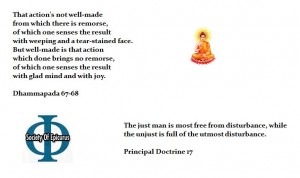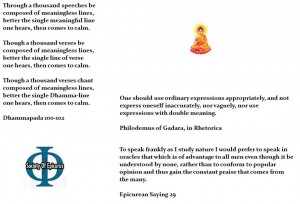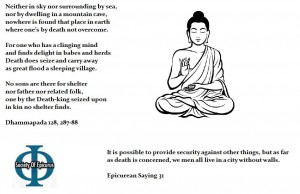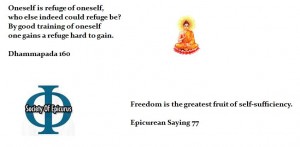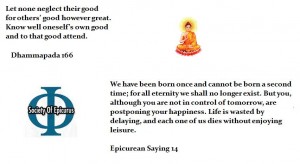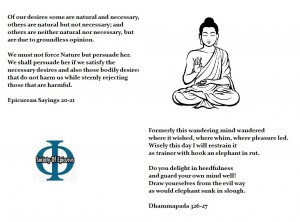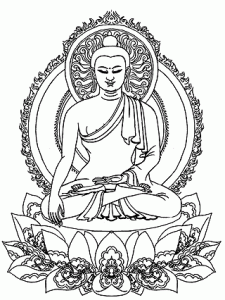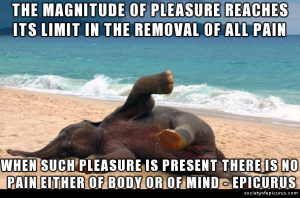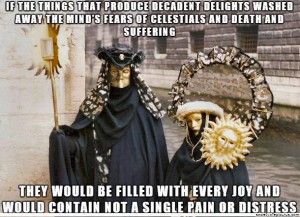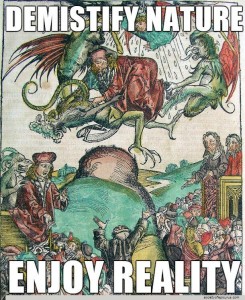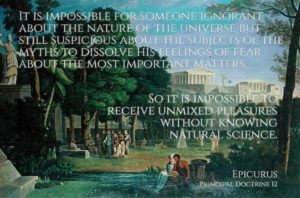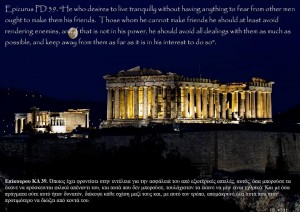Our tradition is firmly secular and most modern Epicureans would label themselves atheists, humanists, or agnostics, but in antiquity the founders of our School were all pious men, and the ancient atomists had a naturalist theology according to which the Gods were naturally evolved beings who lived in the space between the worlds (metakosmai), and whose bodies were–like all bodies–made up of atoms and void.
The two traditional interpretations of the Epicurean Gods are the older, realist view according to which Gods are natural, sentient beings who live in never-ending ataraxia as described by our Sages, and the newer, idealist view according to which Gods are mental constructs which are, perhaps, therapeutically, culturally and spiritually useful, but nonetheless imaginary. A third view has been proposed in our generation, according to which belief in Gods is neither necessary nor natural, and that their existence can not be justified using our Canon.
But we live in a world governed by fear and awe of Gods, and recently some of the members of Society of Epicurus have been engaged in discussions about the nature of the Epicurean Gods in order to answer questions posed by students of philosophy. Furthermore, we also live in an age where science fiction has begun to explore in detail the repercussions of the possibility of the existence of superior extraterrestrial beings, which is inherent in Epicurean speculation on the innumerable worlds. Portions of these discussions are being published here for the benefit of anyone new to the subject, and to encourage the study of alternative, naturalist views on the Gods as entities within a natural ecology and cosmology rather than as characters in fables and in people’s supernatural fancy.
Dialogues on the Epicurean Gods
First believe that a God is a living being immortal and blessed, according to the notion of a god indicated by the common sense of mankind; and so believing, you shall not affirm of him anything that is foreign to his immortality or that is repugnant to his blessedness. Believe about him whatever may uphold both his blessedness and his immortality. For there are gods, and the knowledge of them is manifest; but they are not such as the multitude believe, seeing that men do not steadfastly maintain the notions they form respecting them. Not the man who denies the gods worshipped by the multitude, but he who affirms of the gods what the multitude believes about them is truly impious. For the utterances of the multitude about the gods are not true preconceptions but false assumptions; hence it is that the greatest evils happen to the wicked and the greatest blessings happen to the good from the hand of the gods, seeing that they are always favorable to their own good qualities and take pleasure in men like themselves, but reject as alien whatever is not of their kind. – Epicurus, in his Epistle to Menoeceus
Alexander. A friend of mine, who is a biology student, has asked me why the Epicurean gods do not experience the emotion of gratitude. After giving an introduction to my view of the gods I ended with my speculation that natural selection has removed the never-invoked vestigial emotion. My answer was:
“Great question about gratitude by the gods. I was stuck there too. There is no single point in any ancient document at which the question is answered directly that I know of. My answer is derived and constructed, and not definitive. All the points I parrot and paraphrase below are found in Epicurus’ three letters, and in Lucretius’s poems, and perhaps some other public and free sources. Many translations exist, and each has their strength and weakness. I have studied them and continue to do so. I understand more upon each reading. I am still learning. Here goes. Its not all my words, but a mix.
When it comes to humans, gratitude is a pleasant feeling. A good feeling. A desirable feeling. A pleasurable feeling. It warms our hearts and puts smiles on our faces. We actively and wisely recall past pleasant moments and actively renew our happiness with such recollections. We humans are not gods, yet, even though we can live a life that can compare to theirs. The virtues of the gods are different from the virtues of humans. In both cases Nature give the animal its virtues. Natural selection gives each life form virtues that help it navigate its natural environment. The Epicurean gods are natural beings that are made of elementary particles just like you and me.
The universe is unbounded. The universe is composed of many cosmos (observable universes). Physics is the same everywhere. The universe is full of life and beings that compare to those animals we know on Earth and similar to beings we can imagine/intuit.
Everywhere on earth that we look, we conclude that human nature has given people the intuition that blessed beings exist. By blessed, we mean happy and able to preserve their nature against the diseases of old age. Hence there must exist beings that we would consider to be gods. Happy and able to preserve their nature against disease. They have all the resources they need to preserve their nature. They have no need to fear for their life, or for their health or for their happiness. They need nothing from us. They gain nothing from interacting with us. The demand nothing of us. They are not unhappy with us. Nature made our cosmos and them. The gods did not make our cosmos.
When our senses are extinguished, during sleep, or when they are unreliable, when we are sick, thirsty, hungry or injured we cannot rely on our mental impressions, which must always be tested via the senses because illusions of all kinds abound, and imagination is encouraged over careful judgement by most people. It is during these times that humans claim to have visions and dreams of the gods. These are never confirmed by a Canonic (scientifically reliable) approach to observation, analysis, testing and thinking.
At this point I tend to IMAGINE an advanced alien species that is self sufficient and happy, and has been for a while, and so natural selection has removed the never-invoked VESTIGIAL faculty of gratitude.
Once again, I have to admit that I am not satisfied with my answer because gratitude is an instrument of pleasure for humans and is invoked in us because natural selection made us that way. Finally you should know, that we do know that the study of the gods is a very advanced Epicurean topic, left for students who had mastered physics, even though having “the proper attitude” about the gods is a beginner topic.”
What do you guys think?
Cassius. Alexander I think THIS in what you said is the key: “They need nothing from us. They gain nothing from interacting with us”. Gratitude would be an emotion of pleasure arising from having a need fulfilled which was not previously fulfilled. If we are postulating a being who already has all needs filled, and needs nothing further, then there would never arise a situation in which gratitude would be displayed, because gratitude is a response to an unmet need being fulfilled. So I think that’s the heart of it. All the rest you said is true too, but I don’t see any way around this being the heart of it.
Ilkka. My answer would depend on the reason she’s asking this. Is this a practical question or is she interested in the minutiae of Epicurean Philosophy … If this is a practical question, my answer would be that they don’t experience gratitude because they don’t exist … This situation would indicate to me that the person is struggling with a lingering fear of the gods, and I’d work on THAT …
On the level of the philosophical theory, Epicurean gods cannot experience gratitude. They are wholly self-contained and self-maintained beings. Gratitude implies that a being has asked for or received help from an other being. An Epicurean god couldn’t be in either position, because it could help itself in any manner required (self-contained and self-maintained). They are Perfect-with-a-capital-P.
Hiram. I remember that the commentary on Philodemus said that gratitude and anger are related to each other, and both are related to their lack of need and their being self-sufficient.
Alexander. Ilkka, what do you mean when you say with a capital “P”?
Ilkka. Perfect in the strongest sense. Not just a garden variety perfect that is thrown around everywhere.
Alexander. That kind of “Perfect” sounds like “imaginary” to me.
Ilkka. Yes, they are 🙂 …
Alexander. The inquirer is definitely struggling with God belief, and is more comfortable sharing thoughts that would incur the wrath of her family and friends in a private space. Here is the initial inquiry:
I’ve been meaning to read this, finally started this morning, and already got stuck wrestling one of the first few lines: ‘Any perfect being has no trouble of its own, nor does it cause trouble to anyone else; and such a being has no emotions of anger or gratitude, as those emotions exist only in beings that are weak”. It says this is one of the principal doctrines, however, I can’t understand how or why gratitude would be frowned upon. Thoughts?
Further on, I appreciate this line “He who desires to live tranquilly without having anything to fear from other men ought to make them his friends. Those whom he cannot make friends he should at least avoid rendering enemies, and if that is not in his power, he should avoid all dealings with them as much as possible, and keep away from them as far as it is in his interest to do so.” (PD 39)
Ilkka. You could say to her that the first doctrine means that the gods (who don’t exist …) don’t repay worship with favours. Gratitude is only frowned upon when people say that gods have it towards those who pray. Humans can, and should, feel gratitude towards those who actually help them. Does she know that this doctrine is talking about the gods?
Alexander. I assume that she thinks that a “perfect being” is a god.
Ilkka. I would make sure of it by asking, because that might be the source of the confusion.
Alexander. Ilkka, I agree that the gods of popular religion, supernatural gods, do not exist. When you say that the Epicurean gods do not exist in practice, what do you mean? Is it that: being able to preserve their nature is impossible due to heat? Is it that: continuous happiness is impossible while at the same time being born beings that pass through a childhood? Is it that physics (Relativity) forbids causal contact between different cosmos? Is it that even if they could arrive in our solar system that they are immediately rendered unable to preserve their nature when they approach our star’s particle emissions? Is it that they are too smart to risk contact with us? Is it that they have better things to do and would avoid us?
Ilkka. Wow! Now that is a headache of questions, a group of questions, like a pride of lions … I’m joking … I mean that if we follow the rules of evidence (the Canon) and apply it to the gods as presented in the works of Epicurus, we see that such beings don’t exist. This is because we know so MUCH more about the universe than was possible for Epicurus. It’s possible that there are extraterrestrial intelligent beings and they could be vastly more powerful than us, but they would be beings LIKE us, not above us like the Epicurean gods. They would need to preserve themselves like us by eating, consuming energy or whatever. Continuous happiness is possible for humans, so it would be possible to ETs as well …
I have no idea what relativity says about contact between the universes of the multiverse … It would be awesome to see what kind of vehicle ETs would arrive in the Sol system. But I’m pretty sure that the vacuum of space would kill them, provided they hadn’t done some serious genetic engineering … Perhaps they are too smart for that. I would avoid most people if I could …
Alexander. Sorry for the barrage of questions. Especially on a topic that we have so little info about.
Yes, we have never met them, and never seen them. Yes, they would need to eat to preserve/remake their particle bonds against the always-existing fast collisions, that knock particles off their bodies, even if they lived in the cold inter-mundial spaces that disconnect the various cosmos, and have few fast particles. Yes they would be made of the same elementary particles as us and so their particle bond strengths would be the same as ours, and if they were in a warm environment like ours they would need to work harder to preserve their natures.
Not sure what you mean by “above us”? As far as I have read, only in happiness and in finding themselves located where they could preserve their nature–ie. in a cool enough place that their particle bonds could be repaired at a faster rate than they’re broken. I suspect we have different ideas about the advanced alien beings, but I also suspect that humans will never encounter them face to face.
Cassius. Alexander, I doubt it is needed for me to repeat what I’ve said in the past, but this is an area where Ilkka and I disagree, so just wanted to make note of that so my silence isn’t misinterpreted. I believe there is nothing in modern science which would render Epicurus’ logic on this point obsolete.
Alexander. Thanks for the reminder. I think my opinion has changed on this topic a bit. I now see the Epicurean “gods” as compatible with the idea of advanced alien beings that take action to be self sufficient, and avoid disease, but could be murdered in principle even if not in practice. They stay away from dangerous beings like us. 🙂
Cassius. That last comment Alexander harks back to (Norman) DeWitt, who makes the point that Epicurus himself never called them “immortal”. Another analogy to this god issue is the “life on other planets” issue. I suspect he considered the points closely related, and they are pretty equally objectionable to the religious types, who want to see men and their redeemer to be the center of the universe.
Alexander. Look at these guys. They live right here on Earth. Everywhere. They are so small we can barely see them and they can preserve their nature from all kinds of danger. I doubt they fear much. Is there any reason they should be excluded?
Alexander then shared a picture of microscopial tardigrades, who “can go without food and water for more than 10 years and can survive the vacuum of space. They can also withstand pressures around six times greater than those found in the deepest ocean trenches, and handle great doses of ionising radiation”.
Cassius. Good question. They may have the “immortality” part covered, but would our anticipation of a perfect being also require that it be intelligent? I gather that the Epicureans thought (or joked) that the gods must speak Greek, so that may be evidence that we’re talking “perfect” in many different aspects …
Alexander. Yes. Intelligence would seem to matter, but I can’t find anything that says that. All that I find is: happy and self sufficient. “Greek” as perfection in language seems to be a big mistake to me. Seems like Diogenes of Oenoanda would take exception to that too. The following tells me that gods are either not immortal or incapable of learning.
For it is fair to assume that every endeavor to transform the mind, and indeed every attempt to alter any other substance, entails the addition of parts or the transposition of the existing parts or the subtraction of at least some tittle from the sum. But an immortal substance does not allow its parts to be transposed, nor does it permit one jot to be added or to steal away. For every change that involves a thing outstepping its own limits means the instantaneous death of what previously existed.
– (Ferguson’s translation of) Lucretius “On the Nature of Things”
Cassius. I see; thanks. I don’t have much insight, other than to say that in regard to “gods”, the key passage to consider is the “on the nature of the gods” section from Cicero where we find the basis of the “waterfall” analogy…
“For the divine form we have the hints of nature supplemented by the teachings of reason. From nature all men of all races derive the notion of gods as having human shape and none other; for in what other shape do they ever appear to anyone, awake or asleep? But not to make primary concepts the sole test of all things, reason itself delivers the pronouncement. For it seems appropriate that a being who is the most exalted, whether by reason of his happiness or of his eternity, should also be the most beautiful; but what disposition of the limbs, what cast of features, what shape or outline can be more beautiful than the human form? You Stoics at least, Lucilius, (for my friend Cotta says one thing at one time and another at another) are wont to portray the skill of the divine creator by enlarging on beauty as well as the utility of design displayed in all parts of the human figure. But if the human figure surpasses the form of all other living beings, and god is a living being, god must possess the shape which is the most beautiful of all; and since it is agreed that the gods are supremely happy, and no one can be happy without virtue, and virtue cannot exist without reason, and reason is only found in the human shape, it follows that the gods possess the form of man. Yet their form is not corporeal, but only resembles bodily substance; it does not contain blood, but the semblance of blood.
These discoveries of Epicurus are so acute in themselves and so subtly expressed that not everyone would be capable of appreciating them. Still I may rely on your intelligence, and make my exposition briefer than the subject demands. Epicurus then, as he not merely discerns abstruse and recondite things with his mind’s eye, but handles them as tangible realities, teaches that the substance and nature of the gods is such that, in the first place, it is perceived not by the senses but by the mind, and not materially or individually, like the solid objects which Epicurus in virtue of their substantiality entitles steremnia; but by our perceiving images owing to their similarity and succession, because an endless train of precisely similar images arises from the innumerable atoms and streams towards the gods, our mind with the keenest feelings of pleasure fixes its gaze on these images, and so attains an understanding of the nature of a being both blessed and eternal.
Moreover there is the supremely potent principle of infinity, which claims the closest and most careful study; we must understand that it has in the sum of things everything has its exact match and counterpart. This property is termed by Epicurus isonomia, or the principle of uniform distribution. From this principle it follows that if the whole number of mortals be so many, there must exist no less a number of immortals, and if the causes of destruction are beyond count, the causes of conservation also are bound to be infinite.”
Alexander. Hmm. Cicero. Less than desirable. I don’t find any mention of waterfall in that. Some immediate reactions: Cicero’s beauty argument seems invalid if we spit on beauty when it does not bring pleasure. But noninteracting gods cannot bring pleasure except by unfortunate dreams and unreliable visions, and we’d rather fail than succeed by fortune.
Seeing with the mind is “imagination”. Right? Humans are not the only animals that reason. Natural selection gives virtues to all animals, to a lesser or greater degree.
I fail to understand Isonomia. It implies that gods reproduce, but that implies they reorganize their elementary particles and so that means they can be killed. Perhaps we are the gods. If only we could be happier!
Cassius. I think I am referring to DeWitt with the waterfall analogy, or the analogy of moving pictures and movies. As far as seeing with mind, I am not sure that means imagination, at least not if imagination means “making it up”.
Isonomia is very interesting. I am not sure that it implies reproduction but the implication is multiple gods because of the other observation that nature does not make only a single one of a kind. Also with isonomia I think there may be some relationship with anticipations or maybe just the standard way that the faculties interact, but it seems to me the core of it is some process or capacity by which we recognize or have the ability to order items into a series of “higher” and “lower”, in other words I think there is something here that helps us think up the series of characteristics that would come together to form a “perfect” being at the top versus a “primitive” being at the low end.
And there might perhaps be the kind of pleasure in contemplating or visualizing higher beings that perhaps it seems dogs have in interacting with people–as an example. They seem to instinctively be happy around humans beyond just a good source. I think that it is possible that such a reaction might be similar to what the ancient Epicureans were suggesting we would feel with the beneficent images from “gods”. Not sure, but something in that direction. Or maybe just the sense of admiration that a young tennis player might feel in personally interacting with Arthur Ashe or John McEnroe–my sports analogies are dated.
I suppose to comment on this point, it is very important for our confidence in the stability of the universe to consider that there is at some level some “smallest” particle which carries the basic characteristics which give the universe stability. I certainly don’t consider a particle a god, but Epicurus appears to have been looking in the isonomia concept at a sliding scale from most primitive to highest, and that just as an elemental particle is absolutely stable and needs/gives nothing, he was probably thinking that a “perfected” form of life would have the same characteristics. I think I do agree that Epicurus would probably say that he had never seen one himself nor expected to, but this kind of logical argument–or, should I say, arguing at this kind of basic theoretical level–is probably necessary for some people, who would otherwise worry that there is some possibility that Jehovah (or Allah, or Krishna) does exist. Remember the passage in Lucretius about arguments that win “coming and going” or something like that–cutting off the enemy’s retreat. I think this is that kind of argument.
… Now that I think further, wasn’t the reference “Greek or a language like Greek”? This phrasing “or an X like X” seems to have been an Epicurean pattern.
Ilkka. Cassius, you wrote above: “I believe there is nothing in modern science which would render Epicurus’ logic on this point obsolete“, in reference to the Epicurean gods.
My point is that it’s NOT his logic, but the evidence that he (could have) had at his disposal. I think that if Epicurus saw the evidence we have, he too would come to the conclusion that the Epicurean gods are not possible.
From particle physics we know that there are only so many possible combinations that material beings can be made out of, and none of them seem to produce gods. We know from looking into the universe in ever broadening range of wavelengths that there doesn’t seem to be intelligent life anywhere near us. And studies of human perception have shown that although many people THINK they have seen ‘gods’, they really haven’t. It’s not that the Epicurean gods are at odds with modern science–though they are–but that they are at odds with Epicurean epistemology. And the Canon of Knowledge trumps theology every time …
Cassius. In a universe that is infinite in size, which is not theology but deduced from the principles of atomism, it is impossible to say that we can ever see far enough to rule out all combinations that exist in the universe.
Elli. From Diogenes’ inscription:
Only a few men among hundreds are conscientious because they fear the gods rather than the laws. Not even these few are steadfast in acting righteously, for even these are not soundly persuaded about the will of the gods. Clear proof of the complete inability of religion to prevent wrong-doing is provided by the example of the Jews and the Egyptians. These nations, while being among the most religious and superstitious of men, are also the most vile.
So what kind of gods or religion will cause men to act righteously? Men are not righteous on ACCOUNT OF THE REAL GODS, nor on account of Plato’s and Socrates’ judges in Hades.
With your permission, my Epicurean friends: in the above paragraph I understand that Diogenes examines the consequences and he declares clearly that both of gods (REAL and FAKE) do not cause men to act righteously.
So, according to the above from Diogenes, we understand that he examines the matter of “gods” under the term of “benefit”. How beneficial are the gods for a human being to live a happy and pleasant life? As we have confirmed with our own senses and history, there is no benefit at all. From Epicurus’ Epistle to Menoeceus, we undestand that to live a pleasant life we have to connect it with wisdom (or prudence) as all virtues spring from it.
Wisdom is something more valuable even than philosophy itself, inasmuch as all the other virtues spring from it. Wisdom teaches us that it is not possible to live happily unless one also lives wisely, and honestly, and justly; and that one cannot live wisely and honestly and justly without also living happily. For these virtues are by nature bound up together with the happy life, and the happy life is inseparable from these virtues.
Another point of the letter is:
But, men do not understand that the gods have virtues that are different from their own.
Must we connect the virtues with prudence and pleasure? Yes! Question: which are those different virtues that the gods have to maintain for ever to live pleasantly? OR do the gods not live pleasantly? If gods do not have pleasure this means that they are against all of Nature. For this reason, in my opinion, Epicurus placed gods in metakosmia (intermundia).
Question: Did Epicurus declare whether the atoms and the void exist in the intermundia (the space between the kosmoi)? Our first principle is that the atoms and the void exist everywhere. So, the gods live in a place where Nature gives to those upper beings the same aim: “pleasure”.
Why, then, are gods such kinds of beings that have different virtues from us? Their different virtues based on the fact that they keep their energy and pleasure on the level of 100% constantly and they do not worry about food, water, and there is no entropy. The universe is not a closed system. If we have a confirmation of this, then we have to admit that the gods are obvious.
What is obvious and what has been confirmed? Particles and the void, and endless energy. In my view, when Epicurus spoke about “gods” who are obvious, he meant and described the particles, the void, and the endless energy. In my view, the “void” has the same meaning as the word intermudia. If it was not like this, then we have to call Epicurus “idealist” and not “materialist”.
Hiram. According to Philodemus’ scroll On Piety, Metrodorus proposed a theory whereby immortal gods might be viable, based on an unclear concept of something being numerically indistinct. This sounds like the way in which a beehive or some insect species constitute an autonomous super-being by virtue of being so numerous. It’s a fascinating concept, and I wish we had better and more complete sources on this.
Metrodorus … explained that if a compound is made of things that aren’t numerically distinct, these things may be imperishable and indestructible or divine. In his work “On Holiness”, Epicurus is quoted as elaborating a doctrine about the physical Gods being eternal and indestructible, and saying that one who exists in this manner “in perfection as one and the same entity, is termed a unified entity“.
Alexander. I have similar, but not identical thoughts. I thought that perhaps the gods were elementary particles, but ruled that out, since such could not be happy. Then I thought maybe they were composites of one kind of elementary particles, but that could not be complex enough to experience happiness, or be able to preserve its nature. With regards to preserving their nature, the inter-mundial spaces provide good shelter.
The inter-mundial spaces must have some particles even if the density is much less and the particles are much slower. Kind of like intergalactic space is said to be cold (less particles and slower particles). But this means a lack of action, and so living longer adds no benefit, since it does not mean more pleasure.
No entropy? How can there be no entropy? No entropy, no change, no sensation, no pleasure, no virtue, no nature to preserve.
Elli. The universe not being a closed system, and having endless energy. And if we base ourselves on the atoms to prove the swerve (free will), we have to base ourselves on the atoms to prove the obvious nature of gods as Epicurus said.
Alexander. The Universe, not a closed system? Do you mean the cosmos? There are many cosmos, but only one Universe. Nothing can enter the Universe from outside it, and nothing can exit the Universe.
Elli. Yes many Cosmos and only one Universe.
Alexander. The Universe is closed by definition. Right?
Elli. Right! Cosmos is not a closed system. Right?
Alexander. The kosmoi are not closed systems. Modern science calls them “observable universe”. We know there are many but we can only observe our own. We only have evidence from our own. The kosmoi are born and die. We can see the evidence of our cosmos birth. Big Bang.
Cassius. There are all sorts of questions here but I think it is useful, because there will be clues to the train of thought by asking these questions. What attributes would a highest perfect being have. Consciousness would seem mandatory. But we know that consciousness comes from / through nonconscious particles. So even if we don’t worry about whether the term “God” is appropriate, we ought to be able to approximate their view by considering how men might “evolve” into deathless, fully self-sufficient organisms. And there’s no need to exclude the idea that this “evolution” comes from scientific genetic engineering. We are making fast progress ourselves, and the time we have to continue making improvements is essentially unlimited. And since the universe is infinitely old, and boundless in space, one would expect and presume that the process of perfection of life forms has occurred an innumerable number of times in the past.
Elli. But Cassius, as we said with Alex above, our Universe is a closed system and there is entropy. The energy one day will finish. How can those beings or gods maintain their energy forever in a closed system, as our Universe? For this reason, Epicurus placed them in metakosmia or intermundia. This means between the kosmoi.
Alexander. Hold on. There is entropy. What does that mean from a particle point of view? It means only that some particles are faster than the average speed transferred between them upon scattering events (collisions, absorptions, and emissions). Meaning change within our cosmos exists for now. Our cosmos will die–change in our cosmos will cease. We cannot conclude the same for the Universe. We can only observe our cosmos, hence we never observe anything that resides “between the (plural) cosmos”. Not that I even know what “between the cosmos” even means. Sounds like “imaginary” to me.
Cassius. I am not sure I am following the closed system implications, but Lucretius clearly states that in total, the forces of creation prevail over the forces of destruction, or the universe would have long ago ceased to exist. If “closed system” conflicts with this, then I would say it is not. Only in the verbal sense of defining universe as “all that there is” would I think the term could be used, and even there it would be necessary to stipulate that “closed” does not mean numerable. I do not claim expertise in this so correct me if I am wrong, but I do not think it is a good idea to talk in terms of observable universes because an infinite universe is going to be infinitely larger than that which is observable to us.
Hiram. Right, if the universe is really infinite, and if so is the number of atoms, then the question of exhaustion of particles and entropy can be in theory overruled because there is no end.
Alexander. The universe is closed, according to the Epistle to Herodotus. Nothing can enter or exit it, but that does not mean the universe will run out of motion or particles (energy). The cosmos we live in will die (reach particle equilibrium) and no further change will occur in it.
Cassius. As I reread what you wrote, Elli, I think we are together. There are innumerable kosmoi …
Elli. We read that this imperishable being has the feeling of pleasure, for it is happy! If this being had not the feeling of “pleasure”, that would be against the Nature. Wouldn’t it?
Principal Doctrine 1. Any being which is happy and imperishable neither has trouble itself, nor does it cause trouble to anything else. A perfect being does not have feelings either of anger or gratitude, for these feelings exist only in the weak.
Do you know, Cassius, that in ancient Greek language PD1 continues: Elsewhere he (Epicurus) says that the gods are perceived by the mind, that some were subjected by number (ie. as individualities), others as their likeness that was formed from the continuous (prosthetics) flow of identical images which end up in the same place, (and that they are) anthropomorphic … (?)
Cassius. Also we have to remember that Epicurus was always constructing plausible alternative explanations, and stating clearly that any number of alternatives consistent with our limited evidence, and not contradicted by our limited evidence, may be part or all of the truth. So by definition with our limited evidence it would be improper to assert that only one explanation can fit the bill where multiple explanations also fit the evidence.
Good point, Elli. He clearly was talking not just imperishable but also “happy”, and that surely implies consciousness …
Elli. Is it true that particles and the void exist all over the kosmoi? Why did Epicurus place the gods in “metacosmia”? This means between the kosmoi. If a sentient being lives between the kosmoi, and it is happy and pleased—as it maintains its energy internally–how can they communicate with other kosmoi and send identical images to us? That is, how does the mind perceive their images? My mind goes to the particles only. These can end up in the same place and be anthropomorphic too.
Alexander. Yes. If they are “between the kosmoi” then it is impossible to bidirectionally communicate to entities within the cosmos, but not impossible to have one way communication from the far past arrive into the future of a cosmos as long as the universe is expanding. Eventually it will be impossible. For example today we have evidence of the birth of our cosmos, but in half a million years, no living being will have access to that fact. The cosmos will look unborn to them.
In the same way, a god could have transmitted a broadcast 12 billion years ago and that could arrive here but the expanding cosmos prevents communicating back. Eventually the god is forever kept from interacting with us too. Even one way communication eventually fails to keep up to the expansion rate.
Elli. “Even one way communication fades”. Alexander, do you mean that they can’t send images and we can’t send our images back?
Alexander. Yes. Eventually the distance and the separation velocity is too large to be overcome even by the fastest particles. Even the unsurpassable particles. Photons.
Elli. Is there somewhere in the kosmoi any other velocity faster than light? In my opinion: yes, our mind, which can run anywhere faster than light. This means that we can imagine everything. So if the gods can perceived by the mind, and if we connect them with justice as Diogenes said … but now, as we know, “justice” is not something that can be perceived by the mind, only Plato said that. So, the perception of the gods is totally useless for human beings and provides no benefit to live a pleasant and untroubled life. Epicurus was right to place them in metacosmia! No communication, just images of our imagination. As Liantinis explained and said it: “GHOSTS are the gods for Epicurus”.
Alexander. I think I agree with your conclusion, but not the premise of faster than light minds. Mind is matter. Our brain neurons communicate by the exchange of ions. Ions are electrically charged chemical elements with significant mass and inertia, but the electrical charges they have are mediated by photons. These are the fastest and lightest elementary particles. Our imagination takes short cuts, and does not generate reliable complete images, and hence can “leap” to conclusions. The conclusions might be wrong.
Elli. Alexander can you tell me please, if the scientists managed to see and watch the particles? Because an Epicurean friend somewhere wrote that we did not see them yet, and we perceive them only by the mind as we perceive the gods!
For the record, there is this and this.
Alexander. Animal/human eyes see by photon collisions changing the shape of retinal molecules that transduce electrical charge. No eye or instrument is capable of seeing chemical elements by photon collisions, of the kind that eyes are sensitive too. It is impossible. Epicurus was right.
However we can collide electrons off of chemical molecules and large atoms. If we collide many many electrons off chemicals and observe their ricochet patterns we can deduce their shape and density. People say “we photographed” the chemical, but its not photography by photons. These instruments are called electron microscopes. “Electrography”.
We can also deduce the shape of some molecules by bombarding them with x-ray photons and observing the patterns of reflected photon on xray sensitive photographic paper.
Epicurus taught us that all sensation is by “touch”. That is why we collide particles with the target that we hope to learn about. The photons that human eyes can detect are not suitable for detecting chemicals. They are even less suitable for seeing elementary particles.
There are three types of “scattering events”. They are:
1. collision
2. emission
3. absorbtion
Epicurus knew this. Collision means that the projectile particle that has been emitted in the direction of a target body is repulsed when it comes near the target body under investigation. This is “touching”. If there is no repulsion, there is no “touching” and there cannot be sensation.
Regarding the forces of creation and destruction. On the Universal scale the creative forces exceed the destructive ones, but not on smaller scales.
I take this as self evident. I mean of the four known forces gravity is always attractive (creative) and the others have both attractive and repulsive actions that cancel, on average, when summed at long distances. At Universal scales gravity dominates despite the fact that at short scales it is the weakest.
Elli. How many things I learn from you, Alexander, and how happy you make me when you say that “Epicurus knew this”! We are “touching” his philosophy, and keeping in touch with each other. I am really so proud for my Epicurean friends all over the world.
I wish to finish my life in that moment when Epicurus’ philosophy helps and gives many people mental balance, as he gave to me. Next year I will start to write a book addressed to my unborn grandchildren. They have to learn everything that I did not know in my childhood, when darkness covered the light of pleasure and happiness. I will write down the punishments from my “teacher” of theology. I still remember his red face, how he goggled his eyes, and that steam in his ears when I asked him questions and I didn’t get the right answers.
And thus ends the record of our dialogues on the Epicurean Gods.

, by Kurt Lampe.



